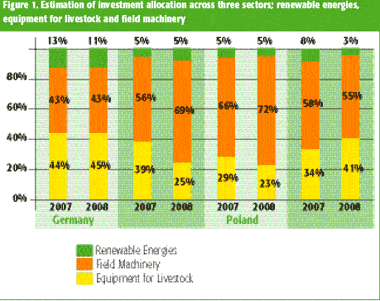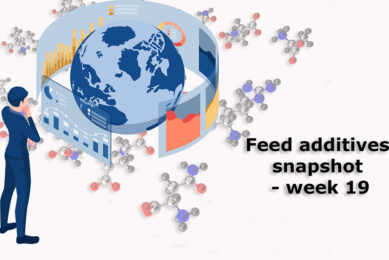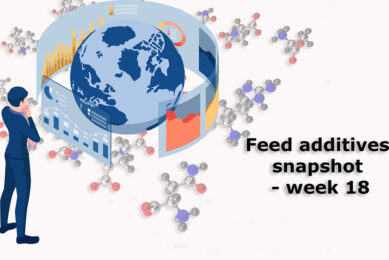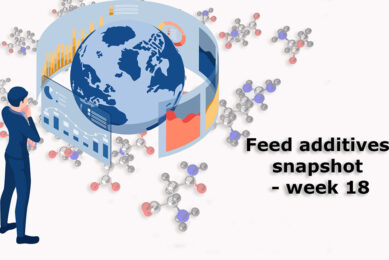European farmers remaining optimistic

The boom in the agricultural markets has fundamentally altered conditions in the farming sector. Arable farmers have profited from this situation, while livestock farmers have struggled not only with growing energy costs, but also with rising feed prices. The climate may be set to change, as will become evident during EuroTier 2008 this autumn.
By:
Dr Andreas Quiring, Head of Farm Economics, Competence Centre
Agriculture and Food business
Stephanie Jürgens, Project Manager, Competence Centre Agriculture and
Food Business
The best assessments of the general economy and
individual business situations in Europe were recorded in spring this year. Only
pig farmers saw their own current situation critically against a background of
low producer prices and high feed costs, but they too were looking to the future
with cautious optimism. However, the survey conducted in spring 2008 reveals
that the mood among European cattle farmers is distinctly more positive. Twice a
year, in cooperation with the agricultural market research institute Kleffmann
Group (Lüdinghausen, Germany), nearly 3,000 leading arable farmers and livestock
farmers in six European countries (Czech Republic, France, Germany, Hungary,
Poland, and United Kingdom) are questioned about their views on the current
situation in the agricultural sector, as well as trends and expectations. The
results of the currently ongoing survey will be presented at EuroTier 2008 and
published by the DLG for the DLG Exhibitors’ Workshop in spring 2009.
European Dairy Farmers (EDF) For more than 15 years, the European Dairy Farmers Club has been |
Livestock farmers less optimistic
The economic situation in the agricultural sector reached historic peak
levels in the Czech Republic, France, Germany, Hungary and the United Kingdom in
2008. A continuous mood upswing was noted in nearly all the countries surveyed
following the low point reached in autumn 2005 with the exception of Poland,
where a slight downturn in assessments of the situation was recorded. This is
attributable to price developments on the pig market and the revaluation of the
zloty.
A detailed consideration of the economic situation in
spring 2008 broken down by key areas of production clearly reveals the crisis in
pig production across all frontiers (not just in Poland). The average ratings in
pig farmers’ assessment of the economy in all countries are 1-2 points below the
overall economic assessment for agriculture (on a scale of 1 =
very good to 5 =
very
poor). At the beginning of the year, 80 % of pig farmers in Germany judged their
business situation to be “poor” or even “very poor” (average score 4.2). Only
farmers in the Czech Republic rated pig farming a little better in economic
terms (average score 3.4). This is partly attributable to the fact that pig
farming in the Czech Republic is generally a sub-sector of large-scale farm
operations with diverse production segments. In all the countries surveyed the
pig farmers expect a distinct improvement in returns in the coming twelve
months, therefore easing the pressure on their economic position. In order to
remain competitive, pig farmers are aiming for higher performance, expansion of
their farms and cost reductions. The upswing in arable farming is just as
distinct as the downswing in pig production. In all countries arable farmers
rate their position as “good” to “very good”. The DLG Trendmonitor Spring 2008
confirms a distinctly improved economic environment for dairy farmers in Germany
in comparison with the year before. Fifty percent of the dairy farmers
questioned describe their business situation as good. The results obtained from
the other countries surveyed also indicate distinctly improved values in
comparison with the year before. However, all dairy cattle farmers express
uncertainty regarding the development of milk prices, dismantling of quotas and
cost increases.
Willingness to invest remains high
Expectations regarding future farm development are distinctly positive.
Farmers are optimistic, but not euphoric. This is also reflected in their
willingness to invest, which was already notable in autumn 2007. Against the
background of sharp rises in grain prices in autumn 2007 this willingness has
continued to grow across all branches of farming. Answers to questions about
investments planned for the coming 12 months revealed this clearly. The
responses by leading farmers in Europe indicate that a continued high level of
investment can be expected. Spending is continuing to rise in the Czech
Republic, France, Germany, Hungary and the United Kingdom. Once again Polish
farmers form an exception here. Their investment plans are declining slightly,
although still at a high level. Possible causes of the reduced readiness to
spend could be delays arising in applications for, and disbursement of, EU
monies and liquidity situations that limit the range of Polish farmers.
 |
There are large differences between countries regarding the areas scheduled
for investments. In spring 2008 the focus was on investment in agricultural
machinery and plant production. However, livestock husbandry farmers also
revealed a substantial rise in their investment plans. Expenditure on dairy
cattle housing improvement and construction heads the list in France, Germany
and Poland, while renovation and modernising of farm buildings was favoured in
the Czech Republic.
Investments in solid manure storage were prominent in Hungary. This indicates
that professionalising of production and optimising work schedules rank high
among business-minded farmers. In the arable farming sector, tractors were the
key target of investments in all six countries in spring 2008. This was followed
by equipment and machinery for tillage and drilling, fertilising and plant
protection, as well as harvesting and transport. The rise in producer prices is
clearly evident here and is leading to greater investments in machinery and
equipment for securing harvests and returns. Interest in grassland and forage
harvesting machinery is also growing again, particularly in Germany and the
Czech Republic.
Main issues for European farmers
The question “What issues currently concern you the most?” produced in some
cases widely differing answers from the six countries surveyed. Generally
however, it is evident that developments in producer prices (including meat
prices) were discussed heatedly last spring. Against the backdrop of the
dismantling of quotas, milk prices especially were, and are, a leading theme in
Germany. Prices for farm inputs are also a major topic among farmers and are
attracting more attention. The relevance of the EU’s agricultural policy for
European farmers has however been declining steadily since 2006. Its
significance has only increased again in France as a result of discussions on
the Health Check. 23 % of French farmers declared this to be a main topic of
discussion.
Developments in agricultural policy are increasingly slipping down the scale
of subjects of interest and market mechanisms are rising to take their place. It
is not only domestic markets that influence production conditions and producer
prices as the world market assumes a steadily increasing important role.
agri benchmark
Global production conditions in arable farming and animal husbandry are the
focus of agri benchmark, the international network of consultants and scientists
at the Johann Heinrich von Thünen Institute in Braunschweig and the DLG. Agri
benchmark records and analyses production systems and processes, production
costs and returns and cost effectiveness broken down by farming segments. This
is done in accordance with a uniform standard so that the data surveyed in the
individual countries can be compared. The surveys are based on “typical farms”,
in other words not statistically average farms, but rather farms that determine
the market and reflect typical production conditions for a region. Furthermore,
through networking with consultants and farmers in the field, not only costs and
returns but also background information on the application of various specific
procedures and production conditions becomes clear. The main results are
compiled in a report and made available to all interested parties at
www.agribenchmark.org. This detailed analysis provides information about
expected future momentum in the respective regions and possible changes within
the production systems that will in turn influence market developments in the
world agricultural market.










